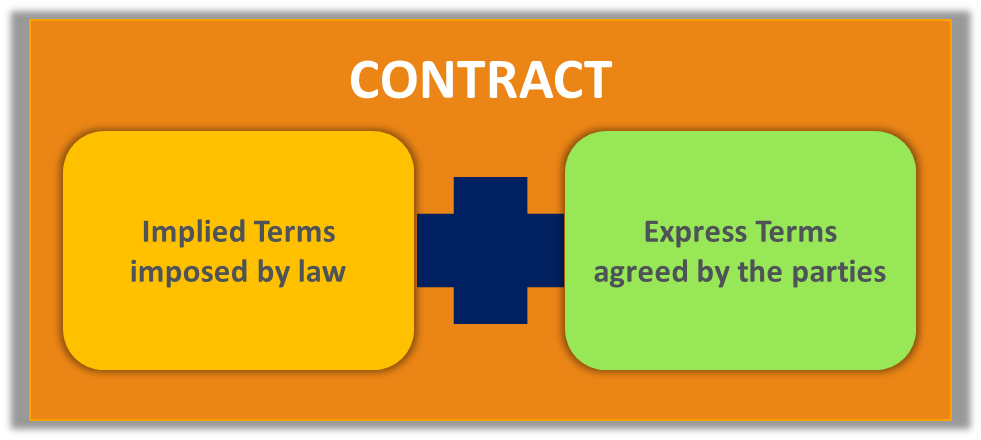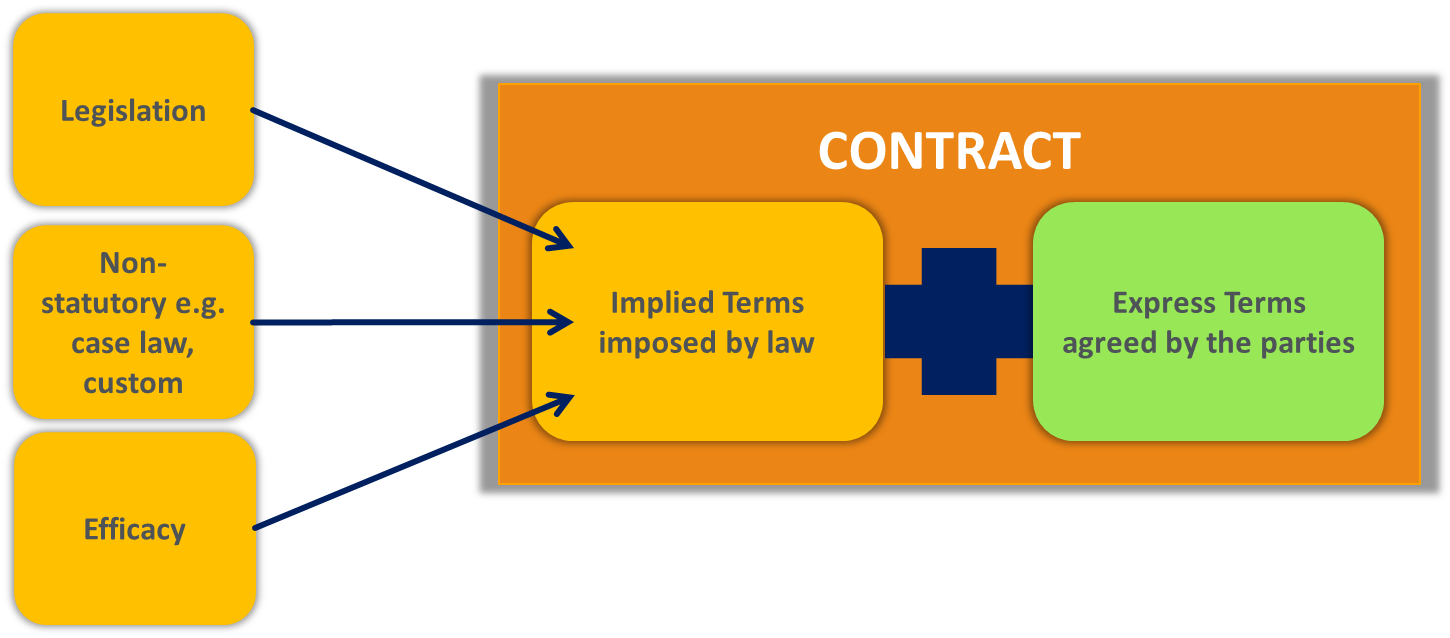Go Global: Issues and Analysis: Implied Terms
1. Overview
What, if any, are the main terms which will or could be implied into my contract?"

Contracts can be made up of both express terms and implied terms:
- Express terms are terms which have been expressly agreed by the parties; and
- Implied terms are terms which have not been expressly agreed by the parties but are incorporated into the contract by the law governing the contract and this happens for several reasons such as:
- the parties have decided to record only the most important terms, leaving other provisions to be understood;
- the parties have not considered that a particular situation would arise which affects the contract and/or trading relationship;
- the makers of the law governing the contract have decided that certain terms must be incorporated into the contract;
- the term is needed to give efficacy to the contract, e.g. to supplement or support the express terms; or
- the term is one which the contracting parties agreed upon but inadvertently omitted.
A common question raised by contracting parties (before, during and even after the conclusion of the contract) who are striving to understand the scope, impact and even the limitations of their contract is: "what, if any, are the main terms which will or could be implied into my contract?"
Determining the content and effect of the express contractual terms is, or should be, relatively straightforward as these terms will have been, at the very least, agreed by the parties (even if they have not been discussed and negotiated) and, it is to be hoped, recorded in writing.
However, determining whether or not any terms have been implied into a contract can be much more problematical as implied terms can originate from several sources (see below). In addition implied terms may apply generally to all or the majority of contracts which are governed by the law implying the terms (for example many legal systems, both civil and common law, imply a provision of good faith into contracts) or only apply to a specific type of contract or only in certain circumstances.
Both civil code legal systems, from which the law is wholly or mainly derived from a written legal code, and common law systems, where the law is derived from both case law and statute, imply terms into contracts, although the range of terms which are implied varies. Civil code legal systems have, by their codified nature, a much larger body of implied terms than common law systems.
2. Common sources of implied terms
Implied terms can originate from several sources:
- Legislation
- Contractual efficacy
- Case law and other non-statutory sources
Legislation: A common source of implied terms is the wide-ranging and diverse collection of terms which are implied by statute (both mandatory and non-mandatory). Statutory implied terms arise both with respect to specific types of contract, such as sales contracts or commercial agents contracts, and standard contract provisions, such as the imposition of a governing law provision in the absence of an express choice by the parties. Statutory implied terms are used in both civil code legal systems (e.g. the legal systems of France, Germany and Italy etc.) and common law legal systems (e.g. the US and the UK).
The content and effect of the terms implied by statute vary from jurisdiction to jurisdiction but there are some common themes which recur such as statutory terms which apply to supply contracts, contracts between businesses and consumer, commercial agency agreements and late payment rules.
Mandatory or non-mandatory? Implied statutory terms can be either mandatory or non-mandatory, but there are some notable exceptions such as China which does not allow the exclusion of statutory implied terms by the contracting parties (i.e. all such terms are mandatory):
- Mandatory statutory implied terms are those provisions which the imposing jurisdiction consider are necessary to give a minimum standard of protection to one or more of the contracting parties, for example statutory controls on exclusion or limitation of liability provisions which impose a "reasonableness" or "fairness" test to establish enforceability or to protect the supply chain by ensuring that sellers of goods have to pass title to a buyer of those goods who makes payment in full. Some mandatory terms can be modified by the agreement of the contracting parties provided that the modified term is not less favourable than the statutory provision to the contracting party whom the statutory provision is intended to protect; and
- Non-mandatory statutory implied terms often comprise a set of contractual terms which apply to a specific types of contract, for example the Sale of Goods Act 1979 for the UK, the French Civil Code, the UCC and the Restatement (Second) of Contracts in the US which allow the contracting parties to choose whether or not to allow them to be automatically incorporated into the contracts to which they apply. The contracting parties can choose to modify or even disapply these non-mandatory implied terms by stating that they will not apply to their contract and/or by replacing or modifying them with express terms in their contract.
It can, at times, be difficult to determine whether or not a statutory term is mandatory or non-mandatory and to identify which mandatory terms can be modified to make them more favourable to the contracting party whom the statutory provision is intended to protect. Some statutory implied terms specify expressly whether or not they are mandatory, for example many of the EU commercial agents rules. Unfortunately many other statutory implied terms are silent on the issue and the intention and effect of these terms have to be considered to determine whether or not they are mandatory. An added complication is that some statutes are silent on the issue of exclusion or modification but the ability of the contracting parties to exclude or modify may be dealt with in another statute, for example certain implied terms of the UK Sale of Goods Act 1979 cannot be excluded or modified by virtue of the Unfair Contract Terms Act 1977.
Case law and other non-statutory sources: Terms implied by case law or other non-statutory sources such as custom or industry practice tend to be a phenomenon which occurs more in the common law jurisdictions, such as the UK, than in the civil code systems. For example German law does not have a doctrine of implied terms as such, but instead it is assumed that all issues arising in connection with the contract are regulated by statute (although the majority of the implied statutory terms can be excluded by the express agreement of the contracting parties).
Contractual efficacy: Some, but not all jurisdictions, will allow the implication of terms into a contract to give commercial or sometimes even legal efficacy to the contract or to reflect the true intentions of the party where they have inadvertently omitted a contractual provision from their contract. This approach is more common in common law jurisdictions, such as the UK, than in civil code legal systems. However, even in jurisdictions which do allow terms to be implied into the contract for the sake of efficacy or to reflect the parties' intentions, the doctrine tends to be very limited in its scope. The courts in these jurisdictions will not re-write the contract for the contracting parties or imply a clause into the contract to make it work more efficiently if that clause is not absolutely necessary. The courts are also consistently reluctant to imply a term into a contract to make a fundamentally unenforceable contract enforceable.
3. Impact on contract drafting
The degree to which contracting parties have to specify the fine detail of the contractual relationship using express terms varies from jurisdiction to jurisdiction, depending greatly on whether or not the jurisdiction has a civil code legal system or a common law system.
Civil code legal systems have, by their codified nature, a much larger body of implied terms than common law systems. This means that the contracts which are subject to the civil code do not have to be drafted in such fine detail as common law contracts the contracting parties can, if they so choose, rely upon the implied terms from the code to regulate their legal relationship.
Contrast this with common law systems which have a much narrower selection of statutory implied terms. The rule of thumb is that the majority of the contractual terms which are required by the parties are included expressly in the contract by the parties. Although there is scope in common law systems for a court to imply a missing term into a contract, such as a term which has been consistently used by the parties in their previous contracts or a term which is the invariable, certain and general usage of a particular trade or place or a term which was obviously intended to be included by the parties but inadvertently omitted, this can be a difficult route for a contracting party to follow to remedy an incomplete contract and best avoided.
4. Why are implied terms so significant?
It is vital for contracting parties to be aware of and understand the scope and effect (legal, commercial and practical) of all the terms which may be implied into their contracts by the law which governs their contracts. This is because implied terms are automatically incorporated into any contract within their scope without the contracting parties taking any kind of positive action to incorporate those terms. Some, some but by no means all, implied terms can be modified or replaced by the contracting parties using express terms but this has to be done clearly and explicitly as the courts of many jurisdictions will err on the side of caution and assume that the contracting parties intend the implied terms to still apply if there is a reasonable doubt that the express wording of the contract clearly excludes or modifies the term.
Most, if not all jurisdictions, have some terms which are implied into the contract on a mandatory basis and these terms cannot be excluded by the contracting parties, regardless of the fact they may be in complete agreement that they want to modify or exclude the implied term. A key part of the negotiating and drafting process is for the contracting parties to take into account the effect that the mandatory implied terms will have upon the other, express, terms to avoid unintended and unforeseen consequences such as conflicts between the express and implied terms of the contract or the parties having rights or assuming obligations of which one or more of the parties was not aware.

